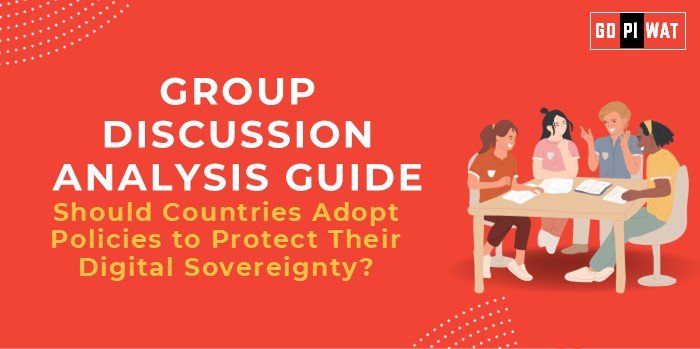📋 GD Analysis Guide: Should Countries Adopt Policies to Protect Their Digital Sovereignty?
🌐 Introduction to the Topic
Opening Context:
In a rapidly digitizing world, data is considered the “new oil,” making its ownership and control critical for national security and economic independence. Digital sovereignty—ensuring a nation’s autonomy over its digital infrastructure and data—has become a hotly debated topic as countries grapple with external cyber threats and economic dependency on foreign tech giants.
Topic Background:
Digital sovereignty involves a nation’s ability to control its digital destiny, encompassing data localization, technology infrastructure, and cybersecurity frameworks. This concept gained prominence with the EU’s GDPR regulations, setting a global benchmark for data protection. Countries like China and Russia have also adopted stringent policies to assert control over their digital ecosystems, while others face challenges in balancing openness with national security.
📊 Quick Facts and Key Statistics
- 📜 Data Localization Laws: 62% of the world’s countries have some form of data localization legislation, emphasizing its global relevance.
- 🌍 Economic Dependency: 90% of the global internet is routed through U.S.-based servers, illustrating digital power imbalances.
- 🛡️ Cybersecurity Threats: The global cost of cybercrime is projected to hit $10.5 trillion annually by 2025.
- 📈 Data Growth: By 2024, 149 zettabytes of data will be generated globally, highlighting the need for robust governance.
👥 Stakeholders and Their Roles
- 🏛️ Governments: Frame and enforce data sovereignty laws to protect citizens and national interests.
- 💻 Tech Corporations: Operate within regulatory frameworks, ensuring compliance with local and international laws.
- 🧑🤝🧑 Citizens: Advocate for privacy rights while embracing secure digital services.
- 🌍 International Organizations: Develop norms and guidelines for digital sovereignty, ensuring cross-border cooperation.
🏆 Achievements and Challenges
Achievements:
- 🌍 EU GDPR: Set a global standard for data privacy, influencing 100+ nations to adopt similar laws.
- 🌐 China’s Great Firewall: Maintains control over digital content, boosting local tech industry growth.
- 🔐 India’s DEPA: Pioneered secure data-sharing models, enhancing user trust.
Challenges:
- ⚖️ Economic Trade-offs: Policies like data localization may increase costs for businesses.
- 🛡️ Cybersecurity Vulnerabilities: Dependency on imported tech increases risks of breaches.
- 🌐 Global Tensions: Balancing national security with cross-border data flow needs diplomatic finesse.
🌍 Global Comparisons
- 🇪🇪 Estonia: Exemplifies digital independence with its secure e-governance framework.
- 🇺🇸-🇪🇺 US-EU: Ongoing negotiations for data transfer agreements illustrate the complexity of sovereignty debates.
Case Study:
India’s Draft Digital Personal Data Protection Bill (2023): Aims to strike a balance between protecting user privacy and fostering economic growth.
📋 Structured Arguments for Discussion
- 👍 Supporting Stance: “Protecting digital sovereignty ensures national security, economic growth, and citizen privacy.”
- 👎 Opposing Stance: “Strict digital sovereignty measures may hinder innovation and increase costs for global trade.”
- ⚖️ Balanced Perspective: “A measured approach to digital sovereignty can enhance security while maintaining international collaboration.”
✅ Effective Discussion Approaches
- 📊 Opening Approaches:
- “With cybercrime costs projected at $10.5 trillion by 2025, is digital sovereignty our best defense?”
- “While the U.S. dominates internet infrastructure, is data localization the right response?”
- 💬 Counter-Argument Handling:
- Highlight economic benefits of collaborative digital policies.
- Reference successful frameworks like GDPR for balanced regulation.
📊 Strategic Analysis of Strengths and Weaknesses
- 💪 Strengths: National security, enhanced data privacy, local economic boost.
- ⚡ Weaknesses: Costly infrastructure upgrades, risk of international isolation.
- 🚀 Opportunities: Global leadership in tech, AI integration.
- ⚠️ Threats: Cyberattacks, loss of foreign investments.
🎓 Connecting with B-School Applications
- 💡 Real-World Applications:
- Projects on balancing globalization with digital policies.
- Case studies on cross-border data transfer frameworks.
- 🤔 Sample Interview Questions:
- “How does digital sovereignty impact global tech collaboration?”
- “Can data localization policies be economically sustainable?”
- 📘 Insights for B-School Students:
- Explore regulatory impacts on multinational corporations.
- Analyze cybersecurity’s role in business operations.


